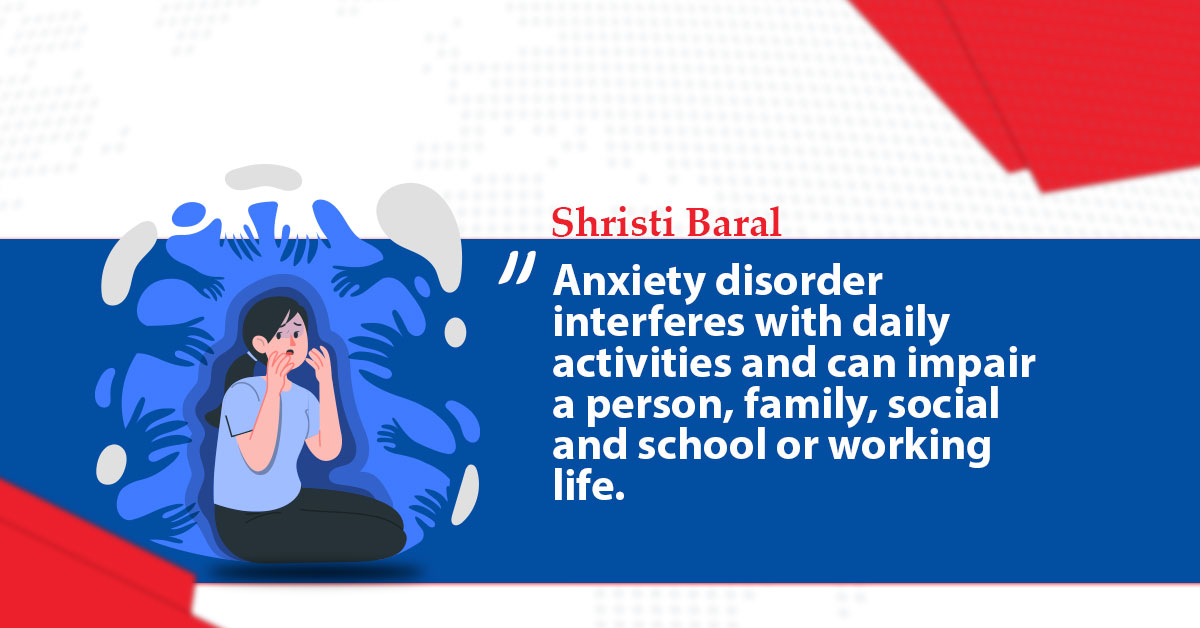

Everyone can feel anxious sometimes but people with anxiety disorders often experience fear and worry that is both intense and excessive.
These feeling are typically accompanied by physical tension and other behavioral and cognitive symptoms. They are difficult to control cause significant distress and can last a long time if untreated.
Anxiety disorder interferes with daily activities and can impair a person, family, social and school or working life.
Anxiety disorder is the most common form of emotional disorder and can affect anyone.
Type of anxiety disorder
• Social disorder: This is an extreme fear of being judged by other in social situations.
• Panic disorder: This means you experience recurring panic attacks at unexpected times.
• Phobia: This is an excessive fear of a specific object, situation or activity.
• Separation anxiety disorder: This means you have a fear of being away from home or your loved ones.
• Illness anxiety disorder : This is anxiety about your health
• Obsessive compulsive disorder: This means you have recurring irrational thoughts that lead you to perform specific, repeated behaviors.
• Post traumatic stress disorder (PTSD): This is anxiety following a traumatic event.
• Chronic disease: Managing conditions such as chronic obstructive pulmonary disease (COPD) and diabetes may result in anxiety symptoms.
• Major depressive disorder: A strong relationship exists between depression and anxiety.
• Substance use disorders: many people with anxiety may try to self medicate to help manage their symptoms.
Symptoms of anxiety
• Fear, panic and uneasiness
• Feeling irritable, tense or restless
• Nausea or abdominal distress
• palpitations
• Sleep problems or feeling tired
• Not being able to stay calm and still
• Feeling of panic, doom
• Shortness of breath
• trembling
• Inability to concentrate
• Intensely or obsessively avoiding feared objects or place
• Dizziness
• Sweating
• Numbness
Causes of anxiety disorder
• Genetics
• Environmental stress
• Stress
• Medical conditions: Some heart, lung and thyroid condition can cause symptoms similar to anxiety disorders or make anxiety symptoms worse.
• Drugs or alcohol withdrawal or misuse
• Brain chemistry
• Situation such as surgery or occupational hazard
Diagnosis
• Physical examination
• Mental health tests
• psychological questionnaires
Risk factors of anxiety disorder
• Substance use
• Environmental concerns
• Stress
• Negative life event
• Trauma
• Severe illness or chronic health condition
• Low self esteem
• Other medical issues such as depression or diabetes
• Genetics
• Life history
• Personality traits: Shyness and nervousness in childhood
Treatment
Anxiety medication
• Anxiolytics
• Benzodiazepines
• Antipsychotics
• Selective norepinephrine reuptake inhibitors (SNRIs)
• Selective serotonin uptake inhibitors (SSRIs)
• Beta blockers
Therapies for anxiety:
• Psychotherapy
• Cognitive behavioral therapy (CBT)
Managing anxiety disorder symptoms
• avoid caffeine
• eating a healthy diet
• meditating
• getting enough sleep
• avoid alcohol and smoke
• exercising
Prevention
• Stress management
• Avoid caffeine, alcohol and smoke
• Therapy
• Mental health programs
Complications
• Depression
• Chronic pain
• Substance misuse
• Sleep disturbance
• Suicidality
• Social isolation
• Difficulty keeping up at home, school, or work